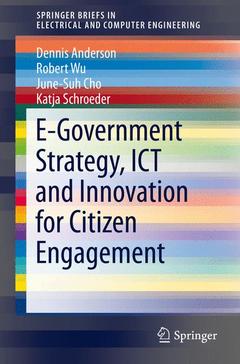Description
E-Government Strategy, ICT and Innovation for Citizen Engagement, 1st ed. 2015
SpringerBriefs in Electrical and Computer Engineering Series
Authors: Anderson Dennis, Wu Robert, Cho June-Suh, Schroeder Katja
Language: English
Subject for E-Government Strategy, ICT and Innovation for Citizen...:
58.01 €
In Print (Delivery period: 15 days).
Add to cartSupport: Print on demand
Description
/li>Contents
/li>Biography
/li>
This book discusses three levels of e-government and national strategies to reach a citizen-centric participatory e-government, and examines how disruptive technologies help shape the future of e-government. The authors examine how e-government can facilitate a symbiotic relationship between the government and its citizens. ICTs aid this relationship and promote transparencies so that citizens can place greater trust in the activities of their government. If a government can manage resources more effectively by better understanding the needs of its citizens, it can create a sustainable environment for citizens. Having a national strategy on ICT in government and e-government can significantly reduce government waste, corruption, and inefficiency. Businesses, CIOs and CTOs in the public sector interested in meeting sustainability requirements will find this book useful.
Introduction: Global Challenges in Turbulent Times: Road to Sustainable E-government.- Effective, Inclusive and Citizen-Oriented Service Delivery, and Governance Innovation.- The Changing Role of ICT in Government.- Six Good Practice Case Studies.- Conclusion.
Dr. Dennis Anderson, Ph.D., is Chairman and Professor of Management and Information Technology and the Institute of E-government and Sustainability at St. Francis College, New York City. He also serves as Executive Chairman of Center for Entrepreneurship at St. Francis College. He is also an eminent global adviser and expert of e-government and public administration to the United Nations Expert Group. Anderson received his Ph.D. and M.Phil. in Mathematics Education from Columbia University. He also received an Ed.M. in Instructional Technology and Media from Columbia University. In addition, Anderson holds an M.S. in Computer Science from New York University's Courant Institute of Mathematical Sciences and his B.A. in Computer Science from Fordham University. He also completed an executive-education program in E-Commerce at Columbia University's School of Business and Harvard University's Institute for Management and Leadership in Education Program. For full bio, visit http://www.drdennisanderson.com
Robert Wu, J.D./M.B.A., is Assistant P
rofessor of Accounting and Business Law and the Director of the Center For Entrepreneurship at St. Francis College, New York City. He has held numerous accounting and legal positions within private, non-profit and government institutions including Big 4 accounting firms, investment banks, and the United States Department of Homeland Security, Immigration & Customs Enforcement, and the City of New York. He holds a B.S. in Accounting¸ magna cum laude, from The University of Akron, a M.B.A. from Case Western Reserve University, an M.S. from the University of Pennsylvania and he earned his Juris Doctorate from St. John’s University School of Law. He is licensed to practice law in the State of New York and before the United States Tax Court.Dr. June-Suh Cho, Ph.D., is presently a Professor of College of Business Administration at Hankuk University of Foreign Studies in Korea. He a




